What Is the Point?
In the northwestern corner of Northern Ireland lies the Magilligan peninsula - a jolly, stout little triangle that juts out into the North Atlantic toward the Republic's County Donegal, to form the pool-like Lough Foyle. From base to tip, the peninsula is bisected by the aptly named Point Road, which winds through 4 miles of grassy dunes, then dead-ends at Magilligan Point. Because it is not a through-way, there is only a handful of reasons to be on this road. One is to access the ferry, which sails across to Donegal every couple of hours. Another is to visit the popular Point Bar, beloved by locals for its steak and Guinness pies and seafood chowders.
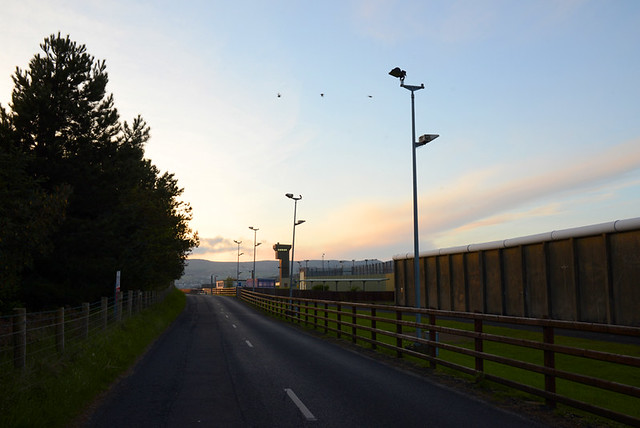
Then there are those who require access to the Magilligan Prison half way down the road.
As well as to the adjacent military firing range/ nature reserve - its sprawling grounds tranquil and golf course-like, with only discreet little flags and bits of terrifying signage warning that the range is sometimes "active."
Aside from these attractions, there is not much reason to be on the Point Road. Unless you are a local cyclist doing interval training - in which case the flat, wide, gently winding, practically car-free 4 mile stretch makes for the perfect playground in which to let yourself go and push your bicycle's speed as far as your legs and lungs and gears can take it. To see a cyclist slingshot past you in this manner is exciting enough. To do it yourself - or at least try - is an otherworldly experience.
Though I've heard of interval training before, it was not until last summer that I actually tried it, on this very road. My casual imitation of the practice is to go as hard as I possibly can for several minutes, then soft-pedal until my breathing and heartbeat return to normal, then repeat, until I exhaust myself with just enough energy left to roll feebly home. Last year I would do this sometimes, on days when too busy for longer rides. This year I tried it again for the fist time last week. I am out of practice and couldn't go as fast and in as high a gear as I could at my "peak" last Autumn. But it was breathtaking nonetheless. The speed at which the scenery flashes past, sky blending with earth and water. The feeling in my legs from this special flavour of acceleration, when I no longer feel the effort of pushing and instead the gear appears to push itself, taking my legs with it. Finally, the teleportaion-like magic of fixating on a distant object - say, a flagpole ("firing range status: Active") - then finding myself passing that flagpole with no sense of time having lapsed in between.
Beside such a flagpole, after my last interval, I now spot a figure that's vaguely familiar. I roll past and recognise a prison guard, now off duty, taking a walk. Our usual banter consists of him reminding me not to point my camera at the prison buildings directly as I attempt to capture their unique greenish hue at sunset - in response to which I test how loosely I can interpret his definition of "indirectly." But today I don't have my camera and he is not standing guard, and only grinning glances of acknowledgement are exchanged between us in the sun's golden glow.
Later, I stop and a cyclist I know pulls over beside me. He asks if I'm racing this summer. Last year I said to myself - and also, apparently out loud - that, if I stayed here, I would try time trials "next season." But now this next season is here, and I am not feeling the inclination. I tell him this, and he nods understandingly. Going to give road racing a try then? God no, I say, not with my handling skills. Sportives? I shake my head. Out of ideas, he looks at me quizzically. Why are you training then? I mean, what's the point of killing yourself for nothing? For a moment I feel defensive and almost tell him about my 300km audax. That should make for a satisfactory answer, I think. He would say "Ach!" finally feeling he has a handle on what's going on, and then we'd move on.
But that would not be an honest answer. Because, in truth, my flying down the Point Road till my vision blurs and I can't feel my legs has nothing to do with this audax, or potential future audaxes, or any local races I may or (more likely) may not ever take part in. There is no point to what I have just done. I simply felt like doing it - my heart so full it had to be done. There was no point, only an impulse. And though I enjoyed it, I cannot really tell you why. So I don't mention the audax, and instead smile stupidly and shrug, and we go our separate ways with the matter unresolved. In the setting sun, the Foyle shimmers behind us. And in the distance ahead looms the compact and jagged Binevenagh Mountain - standing slightly apart from the rest of the Sperrins, like a lone guard tasked with watching over Magilligan's tip.

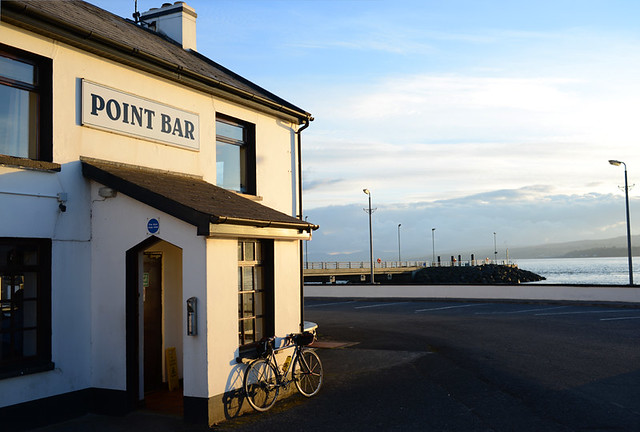
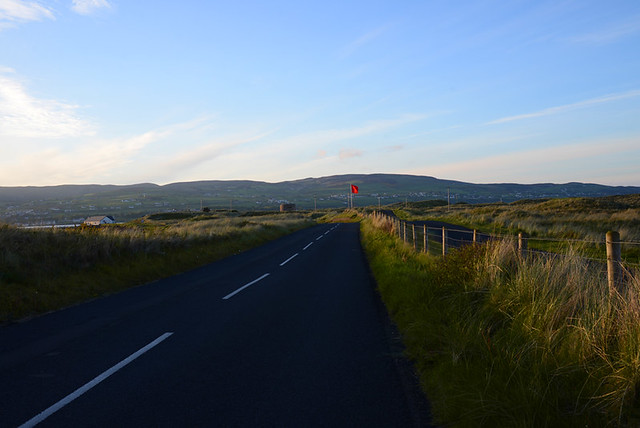
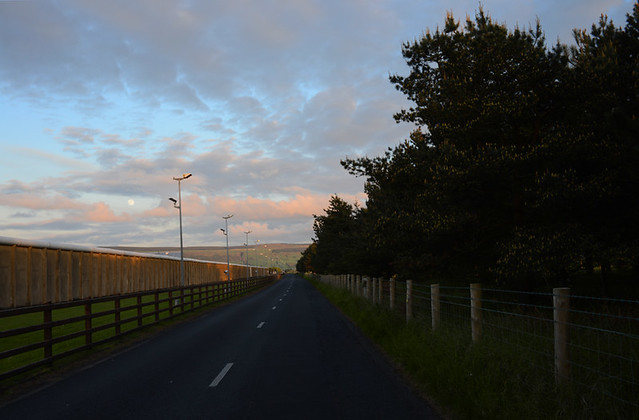
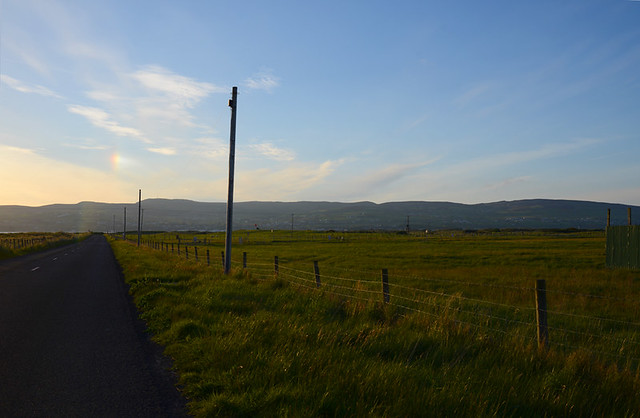
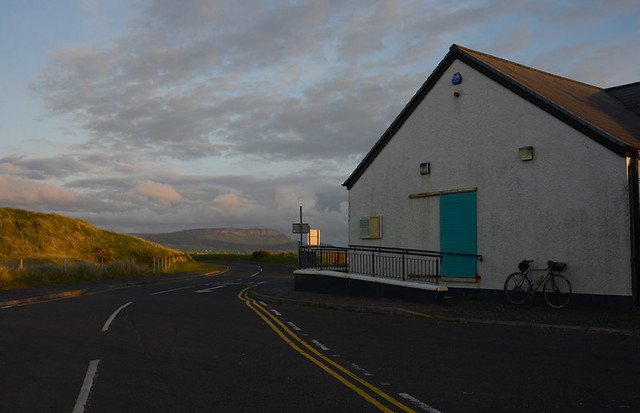
I remember riding in TOSRV, someone saying something about training, and saying "Training? For what? Is there a test?"
ReplyDeleteReally, we're amateur cyclists, and the only point of the competitions is to have an excuse to give people for why we spend so much time on our bikes. "It's because I'm getting ready for ..." But really, the point is the time spent on bike, floating freely yet under precise control over the Earth's surface, feeling certain that the next hill / mountain / century / brevet is firmly within our grasp. That's enough.
It's a little confusing here, because "training" can mean training for a specific event, but it is also just the word people use to mean exercising, instead of the American "working out." So someone can be training for a race. Or they can be going to the gym or for a jog and be "training," without necessarily it being for any purpose other than general fitness.
DeleteWhat's the point? Well, you're not killing yourself, you're enjoying yourself. You're getting exercise. You're experiencing movement in a visceral way. When I take my dog out of the house and let him off the leash he immediately sprints, then stops, then sprints again, playfully and happily. He's not training for anything. Many of us run, or bike, or climb, pushing ourselves in order to stretch, not be bored, grow, maintain sanity, there are so so many reasons to do what you do and training for something is the one which makes least sense to me. I've been a lifelong runner and cyclist and used to race in both activities but can't tell you how many I've seen 'train' for a specific event and then put the running shoes aside or park the bike simply because the next event was too far away to worry about.....They're now much more overweight and less active and more likely to complain about how hard it is to start again. I've not raced in either for years but a day is not a day without pushing myself in one or the other, if just for a brief period. It feels good to be alive. Oh, I suspect over in your land the Guinness afterwords would taste a little better as well...Another good reason ;)
ReplyDeleteI think you misjudge road racing and cycling skills. You've probably got more than enough to give it a try, maybe starting with a less technical criterium or just a straight out road race. You might find yourself enjoying the buzz of a different kind of event. That said, I hate competing anymore. I cycle by myself (unless commuting with my kids) and push to the limit as often as I please without worry about feeling less than I used to be. When my kids go fast, I'm dropped before things even get interesting and it's too demoralizing....There's no point in beating myself up for not keeping up, but there's a point to being out there. As you say, it' makes one happy. My interval training is daily, even if in regular clothes on my one and only bike. Folks (even strangers) tell me they see me everywhere on the bike and I'm always moving fast. Of course I'm not compared to dedicated racers but it doesn't matter because I only care about pushing my now limited boundaries.
ReplyDeleteWell I do know people who race with worse handling skills than mine… which is all the more reason to keep away :)
DeleteBut seriously, I think the bottom line is that when I want to do it I'll know, because I'll be doing it - regardless of any reasoning for or against.
"When I want to do it I'll know, because I'll be doing it" is the unofficial subtitle of this blog.
DeleteIs this fictionalized or did a dude really ask you 'what's the point of killing yourself for nothing?' Seems like a totally clueless question.
ReplyDeleteNon-fictional paraphrasing. But "killing yourself" is just a turn of phrase here. The sentiment being, why would a casual rider do interval training?
DeleteHm. I'm pretty sure you heard of interval training through me.
ReplyDeleteYou do it for the feeling of doing it.
Bicycling Quarterly c.2010. Though I didn't understand what it meant at first.
DeleteOk, I give Jan the W on this, though I did try to explain: http://lovelybike.blogspot.com/2011/12/hill-training-my-epic-semi-fail.html
DeleteYou can lead a cyclist to intervals, but you can't make them drink them.
DeleteMissing the point!
DeleteSteak and Guinness Pie? Should substitute nicely for pizza. I don't know if it sounds delicious but it sure sounds interesting.
ReplyDeleteLugs or lungs? Freudian slip perchance?
ReplyDeleteHa indeed! It would have to be some bad brazing for the lugs to give out : )
DeleteOften, one meets a triathlete acquantance at the Point who after noting your mudguard and handlebar bag offers to accompany you back on his carbon missile.
ReplyDelete1. Establish while you can still speak in sentences what direction he's turning at the end of the Point Road. Probably right towards Limavady. You, of course, had always planned to go left.
2. It's only 4 miles. You can be anaerobic for that distance, enough to keep beside but ever so slightly ahead of him, in an apparently relaxed posture on top of the bars while he's in an aero tuck.
3. Bloody hell, is this really only 4 miles? Does the Point Bar carry a defibrillator?
4. Use the last few molecules of cerebral oxygen to wheeze a cheery goodbye as your paths diverge.
5. Once he's out of view, fall off your bike and cough your lungs up into the ditch.
That's why you do it.
"Does the Point Bar carry a defibrillator?"
DeleteThey stash it behind the hearth for just such occasions.
Hah! I hate anything that is defined as "exercise" but I fully understand "ulster"'s competitive streak. Only, at 59 and generally riding a fixed gear of no more than 75" I have to be careful whom I challenge. But the "fun" of competition kicks in and I amazed myself a week or so ago when someone on the usual carbon fiber passed me without greeting; the adrenaline kicked in and I found I could accelerate that 75" gear 5-8 mph just like *that*, and I paced him for 4 miles or so.
DeleteIt *does* always help to have a strategic turnoff -- one that is close enough and that gives you a believable excuse for parting ways.
Excuse me while I turn off here and discretely puke.
In principle weak handling skills are not an automatic disqualifier for a bit of road racing. It's not hard for the experienced to accomodate. However things do happen when a critical mass of cluelessness is achieved.
ReplyDeletehttp://www.youtube.com/watch?v=vCw80Y18Vr8
Watch that one if ever tempted. This is a big reason for the popularity of gravel grinders, brevets, hillclimbs, time trials and so on.
If the intervals are because you feel like it, it's just riding a bike and do as you please. If you want to get faster do them with a fellow sufferer. A little goes a long way.
I gather you're in you're mid thirties and slowing learning new things about bicycling and exercising and the ways in which they can change one's perspective or help define it. It's lovely to live and articulate and share and accept.
ReplyDeleteSure feels dandy to push yourself.
ReplyDeleteU gotta do it cuz u luv it.
Could be for training I guess.
Kinda better just for fun.
I have a riding buddy for intervals.
Together we push ourselves hardest.
Gotta take a break sometimes tho.
Reel it in a bit.
Just enjoy the scenery.
I gotta just smell the roses.
My thoughts on intervals.
I bike and run for stress-relief and to improve my fitness health. Some athletic people can't understand that. It's as if one bikes and runs to compete. I'm not into that.
ReplyDeleteSteak and Guinness pie sounds heavenly, if the crust is good.
ReplyDeleteWhy do intervals on a cool lonely road like that?
Because it's there.
Because it's fun, and not even really type II fun. Mostly fun-fun.
I don't know about you, but every time *I* come back from a series of intervals, there's a certain amount of joy akin to that of being shot at and missed.
"a certain amount of joy akin to that of being shot at and missed"
DeleteI wonder how many people have a personal experience of this. As a kid I once accidentally crossed a border in pre-Soviet collapse Eastern Europe. Hilarity ensued.
When I worked for a land surveyor in the late 80s, the neighbor in a dispute "accidentally" skipped 3 rounds out of a deer rifle off the road about 30 feet from my helper and me.
DeleteWe weren't in any real danger but it didn't feel very nice. I heartily hoped he would come out the loser in the whole deal but alas, he got his easement and right-of-way.
I think my helper base-ball batted his mailbox periodically for the next few years but I wouldn't have had anything to do with that.
Spindizzy
I was speaking more of the post-event exhilaration part rather than the jagged fear part.
Delete"I wonder how many people have a personal experience of this. "
Probably not very many, thankfully.
Once you've been there, you're not likely to forget.
Been there.
Spindizzy, one round is an "accident". Three is firing for effect.
A friend of mine here, in his 40s, tells me back in the day farmers would "shoot at" kids loitering on their land suspiciously, missing deliberately of course but aiming just close enough to make it feel realistic. Ah the joys of a rural childhood.
DeleteYep, In my younger years I did the same thing - intervals until you drop for no reason other than I just wanted to do it. Why does everything have to have a purpose?
ReplyDeleteHah! Most of what I do seems pointless to most, but it all makes sense to me. Perhaps it will play out well in the long run, we'll see :)
ReplyDeleteWow, the place is unusual :) I would like to go there once a bike.
ReplyDeleteIf you have to ask what jazz is, you'll never know.
ReplyDeleteLouis Armstrong
It is always a struggle to describe the geographic layout of a place, but you do a good job here. The area must captivate you in a way New England did not, as I don't recall posts of a similar nature prior to the move.
ReplyDeleteIt is a distinct, unique geography that I feel compelled to describe and share. Parts of New England captivate me similarly, but I have not lived in them since pre-blog.
DeleteIf you were to train for race, you wouldn't have time to write nice prose, to stop riding and take beautiful pictures. (?)
ReplyDeleteL.
Heh well I probably spend more time on my bike now than most local (amateur) racers. If anything training would mean shorter rides with greater focus and intensity. But I might be too exhausted to type afterwards! Or else write crazy things like this all the time, and not remember it the next morning...
DeleteModern pros think 20-25 hours a week is all that's needed. And they only race 80 days a year, sometimes less.
DeleteThe ultimate counterpoint to that would have been Fausto Coppi's preparation for the 1952 Tour de France under the supervision of Dr. Ernst von Aaken. Six weeks riding 250km daily, every day, rain or shine. At least one evening session on the track per week, 50km or more of speedwork. Fausto rode supported in the sense that he had no responsibilities other than eat, sleep, ride. The rides themselves were done solo. Fausto carried tires and tools. Early postwar Italy had bad roads and bike repairs happened. Gravelgrinding by today's standards. Food was anywhere he stopped, the only issue being that everyone would want to give him a feast and he had to keep explaining grab-n-go.
250km could be anything from 7 to 10 hours. It was more than 60 hours training a week. Of course Coppi crushed the field in the '52 Tour.
Eddy Merckx raced 250 days a year and still trained. Each night before bed he had a habit of riding rollers 30 to 60 minutes. Keeping pedal speed high and always refining pedal stroke. 250 days a year was high even in the Merckx era, 200 was more normal. Of course the very eager raced multiple events many days. Doing afternoon and nighttime criteriums of over 100km each was common. Truly hardcore life in the saddle men like Sean Kelly or Marcel Kint could schedule three criteriums a day. And win them all.
If you really want to talk to the guy about pushing yourself, give him the link to your 300K stories . . . both of them! Going fast for a little while has nothing on the grueling intensity of both of those times. Actually, I forgot, the latest one took place after the meeting. But still, the distance fatigue I think is the tougher of the two.
ReplyDeleteI "train" because I want to shorten my ride time to work, get fit, and keep up with my faster friends in the park and on trips. I want the difference between my "map eyes" and my actual distance limits to narrow. I don't like being way over 200 pounds on Mavic Helium wheels too.
It's also nice to see the positive changes in ability after putting in so much time on the road.
vsk
OT: did a 400km Brevet last week-end. A lot of headwind 4-5 Bft through the night. In a group of 3 riders it was ok, but I never wouldnt be able to had done this this without wheel-sucking 2/3 of the time. So I give you the "nice advise" not only to do some Intervall training, but to develope your ability to follow over 100 km or more other riders with a distance to the rear wheel of 10-20 cm. Not easy, but effictive.
ReplyDeletebest regards, stay tuned on PBP 2015, you can do it, impossible is nothing!
The 300k brevet made me realise I am a little out of practice following a wheel that closely. It is useful skill indeed.
DeleteThere's no need to follow so close as 10cm. Even in team pursuit on the track that would be close. You can do wheel contact drills if you want to do them and it's fine by me but there is no need to be that close. A wheel length back is normally plenty good enough. Behind a group there is often useful draft 2, 3, 5 bike lengths back.
DeleteIn the paceline training rides that introduced me to the practice, we rode 12" apart. That felt like waaay too close at first. And I still remember experiencing that "clicked in" feeling for the first time, from getting close enough to someone's wheel to feel the effects.
Delete12" or 30cm begins to be reasonable but I would not impose that on newcomers. It's not about steely nerves, iron will, flinty resolve. It's not separating the men from the boys or the amazons from the girls. Drafting is an ordinary thing cyclists do.
DeleteMy introduction was a century ride in 1968. I was an underweight sickly sixteen. I rode twenty miles to the start and moved next to where a group of conspicuously fast guys were getting ready to start. They told me I should wait a few minutes and start instead with the good guys. The good guys turned out to be about three dozen chubby men with white hair and copious black woollen clothes. They were all ex-racers and perhaps a dozen had been pro when 6day was the #1 big money sport and the sport was centred in America. Since I was obviously green and raw I was assigned the best seat in the house. My front door was Jimmy Walthour, still the highest-paid rider in the history of the sport. My back door was the legendary Charlie Yaccino. We rolled out four abreast in double rotating paceline formation and it stayed just like that for four hours and 101 miles.
Yes, four hours flat. It was like continuously riding downhill. The group was smooth as glass. Everyone was on the same program. There was no aggression, no attacking, just cooperation. The interval was two to three feet, more like four feet in the gravel sections. Nobody, not even me, spent a bit of time concentrating on the wheel ahead. Why would we? The time went by telling jokes, telling stories, passing sandwiches, passing flasks of tea and flasks of cognac.
I had zero instruction. I did what everyone else was doing. I was not told what to do or what not to do. It worked perfectly. It still works perfectly. If you're doing a two man time trial at 50kph you might want to be at 30cm or even closer. If you're fighting an enormous headwind you might want to bunch closely. Otherwise just relax and ride your bike.
Welcome to the British Isles! I have just checked back into your blog after a while and I find that while I have been away you have moved across to my side of the Atlantic. You certainly have moved to a lovely part of the world, unfortunately it's somewhere I can't live due to my job situation. Your observations about the local weather ring true. Your photos, even when viewed "icognito", could only have been taken in the rainier parts of the British Isles... there's something about the greenness of the grass, the quality of the light and the general characteristics of the geography and the infrastructure that will be instantly recognised by anyone who has been there.
ReplyDeleteI lived in East Anglia for about 4 years in my 20s. It rained about the same as it does here, and the landscape, light and colours were in some ways similar, but in other ways not. I can't put my finger on it, but there is definitely a look to this corner of NI that can't be mistaken for any other place.
DeleteWouldn't it be great if it was like this all the time?
ReplyDelete